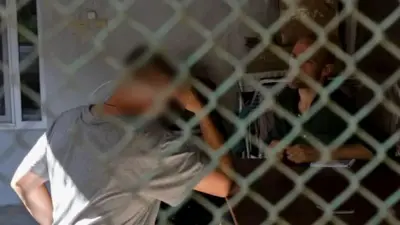We've updated our Privacy and Cookies Policy
We've made some important changes to our Privacy and Cookies Policy and we want you to know what this means for you and your data.
Watchdog to pursue essay-cheat websites
Image source, iStock
- Author, Sean Coughlan
- Role, Education correspondent
The universities watchdog is being asked to pursue websites advertising essay-writing services for students.
Universities Minister Jo Johnson said he wanted "tough action" against the spread of plagiarism and the commercial industry it has spawned.
The Quality Assurance Agency (QAA) said hundreds of "essay mills" were charging up to £6,750 for writing a PhD dissertation.
Mr Johnson said it could "undermine" the reputation of degrees from the UK.
"Essay mills are a major challenge for universities and colleges," said the QAA's Ian Kimber.
"Because, unlike other forms of cheating, the practice is notoriously difficult to detect."
Tougher penalties
Last summer the QAA, which monitors standards in higher education, published a report into the scale of such commercial plagiarism.
It found essay services with charges - depending on length, complexity and speed of turnaround - from £15 to thousands of pounds.
Many claimed to produce customised work that was "100% plagiarism free".
The watchdog said it was difficult to estimate how widely such services were being used.
There were about 17,000 cases a year of "academic offences", it said, but there was no breakdown of how many of these involved students who had used essay writing services.
Essay-writing websites often carry disclaimers suggesting the essays being sold should be used only as examples and not passed off as students' own work.
The universities minister wants a more co-ordinated response to the problem.
Mr Johnson is asking the standards watchdog to take action against essay mills advertising their services to students.
He also wants stronger guidance for students, including "tough new penalties for those who make use of essay mills websites".
"This form of cheating is unacceptable, and every university should have strong policies and sanctions in place to detect and deal with it," said Mr Johnson.
"Essay mill websites threaten to undermine the high quality reputation of a UK degree, so it is vital that the sector works together to address this in a consistent and robust way."
Dame Julia Goodfellow, president of Universities UK, said: "Universities have severe penalties for students found to be submitting work that is not their own.
"Such academic misconduct is a breach of an institution's disciplinary regulations and can result in students, in serious cases, being expelled from the university."
This has been a longstanding problem - and a decade ago Google announced that it would stop running adverts from essay writing services, but such businesses can still be found through online searches.
Top Stories
More to explore
Most read
Content is not available








